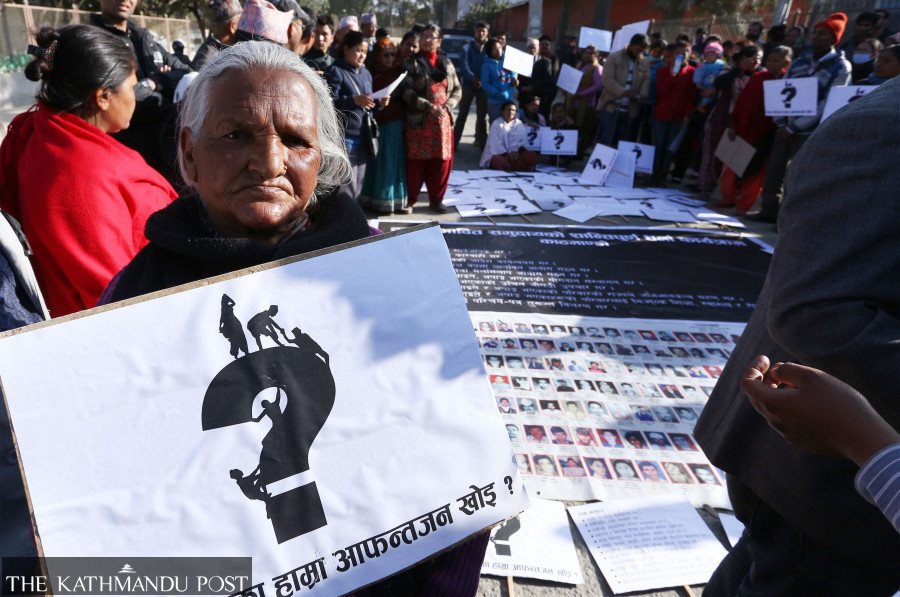National
Deadline to apply for transitional justice commissions extended
Along with retired judges, bureaucrats, lawyers and rights activists, conflict victims have also applied for the positions.
Binod Ghimire
The deadline to apply for office bearers at the two transitional justice commissions has been extended by five days even as more than six dozen individuals have already registered their interest to serve at the panels tasked with looking into conflict-era cases of rights violations and disappearances.
As many 76 legal experts and rights defenders, including the victims of the decade-long Maoist insurgency, applied for the positions of chairpersons and members of the Truth and Reconciliation Commission and the Commission of Investigation on Enforced Disappeared Persons as the first deadline ended on Thursday evening. However, following demand from stakeholders, the committee to nominate 10 office bearers decided to extend the deadline for applications until Tuesday.
Issuing a statement on Thursday, a group of human rights defenders raised questions over the competitiveness and transparency of the nomination process done under an inadequate time to file applications and limited publicity of the call for applications. The victims’ representatives, in a meeting with the selection committee on Thursday, had suggested a deadline extension. The committee led by former chief justice Om Prakash Mishra abided.
“We have extended the deadline by five days while also deciding to call for applications through national television, radio and newspaper,” Khamma Khati, a member of the committee, told the Post.
According to officials at the Ministry of Law, Justice and Parliamentary Affairs, in addition to the conflict victims, retired judges and bureaucrats, lawyers and human rights activists have applied for the vacant positions. "Former office bearers of the two commissions too are among the applicants," an official at the ministry told the Post.
This is the first time those victimised either by the state or by the erstwhile Maoist rebels are contesting to lead the commissions formed to investigate the cases of atrocities from the decade-long insurgency.
Retired supreme and high court judges, retired secretary-level bureaucrats or one qualified to be a top court justice are eligible for the role of chairperson of either of the commissions, as per the Enforced Disappeared Enquiry, Truth and Reconciliation Commission Act. Those who hold a master's degree, are not members of any political party at the time of application and have contributed to human rights, conflict resolution or law are eligible for appointment as members.
The selection committee has set three modalities for application. While individual aspirants can directly apply for any of the positions, different human rights and victims’ organisations can also recommend the names at the organisational level. Such institutions, however, need the consent of the individuals they are recommending. Seventy-one applicants either applied individually or were recommended by some organisations.
After collecting the aspirants’ names, the five-member committee will itself collect the names of experts if the names received through personal applications and organisational recommendations do not suffice. The provision of organisational recommendation and selection by the committee itself was included as renowned figures might not be willing to apply for positions in the commissions.
A shortlist of probable candidates will be made public only after evaluating their resumes and backgrounds. Interested people can send their feedback on the short-listed candidates.
As per its working procedure, the committee will collect public feedback, ask the candidates to make presentations and carry out other necessary tasks before selecting them for appointment.
The stakeholders, however, claim that presentations and public feedback alone are insufficient. The victims of the 1996-2006 conflict and human rights activists have demanded mandatory public hearings for shortlisted candidates before making the nominations.
The two commissions have remained defunct since July 2022, when the government extended their terms without retaining their chairmen and members. The government claimed the bill to amend the transitional justice law would be endorsed by October 2022, and the appointments would be made based on the revised Act.
However, the federal parliament took over two years to endorse the bill. The victims and human rights defenders are now closely watching who will be appointed to the commissions.
The amended Act sets four-year terms for the two transitional justice commissions to investigate the cases and recommend prosecution and reparation. However, if they fail to accomplish their tasks within the given time, they may be granted a term extension.
The truth commission has received 63,718 complaints, while the commission on disappearances is sitting on around 2,400 cases. As the recent amendment to the Act has included a provision to allocate additional three months to collect the applications, the number will further increase.
The commissions, first formed in 2015, have done little beyond collecting complaints and conducting preliminary investigations on some cases. The to-be-formed commissions will be the third formed in a decade.




 18.12°C Kathmandu
18.12°C Kathmandu














